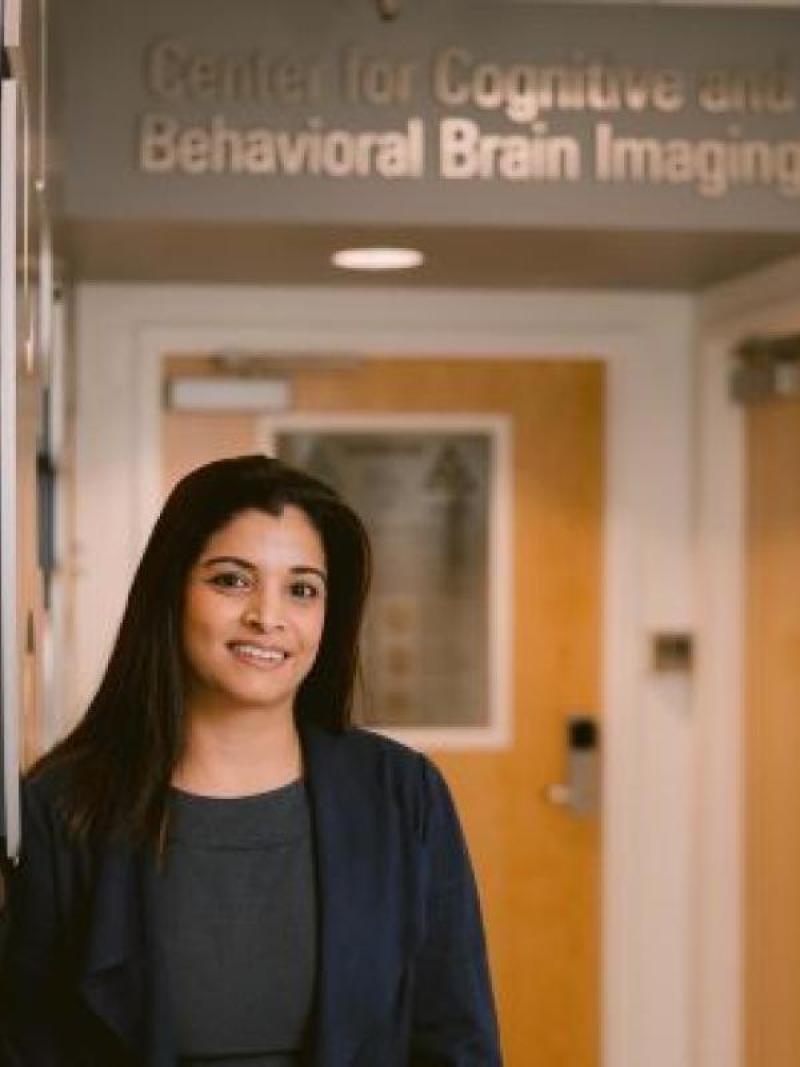Areas, Faculty and Labs
The Department of Psychology specializes in nine areas of research and training. Learn more about the topics, core faculty and labs of each below:
- Behavioral Neuroscience ↓
- Clinical Psychology ↓
- Cognitive Psychology ↓
- Cognitive Neuroscience ↓
- Decision Psychology ↓
- Developmental Psychology ↓
- Intellectual and Developmental Disabilities ↓
- Quantitative Psychology ↓
- Social Psychology ↓
Behavioral Neuroscience
The Behavioral Neuroscience area focuses on understanding the complex mechanisms that influence brain structure, function and behavior:
- Factors influencing plasticity of brain and behavior through development and into adulthood
- Hippocampal biology and function
- Stress and the brain
- Neurogenesis and brain plasticity across the life span
- Sex-related differences in brain function
- Endocrine and immune regulation of brain and behavior
- The neurobiology of cognitive control

Laurence Coutellier

Elizabeth Kirby

Kathryn Lenz
The Clinical Psychology area focuses on research and training clinical scientists in the assessment, diagnosis and treatment of mental health conditions:
- The treatment of mood and personality disorders using cognitive behavioral therapies
- Biobehavioral responses to cancer diagnosis and treatment
- Testing and dissemination of psychological treatments for cancer patients
- Psychological and behavioral adaptation to chronic health problems
- Effects of exercise on psychological and cognitive functioning
- Neuroplasticity in healthy aging and neurological disorders
- Mindfulness and cognitive functioning in older adults

Barbara Andersen

Jennifer Cheavens

Jeremy Grant

Jasmeet Hayes

Scott Hayes

Ruchika Prakash

Megan Renna

Joshua Smyth

Matt Southward
The Cognitive Psychology area focuses on cognitive processes such as memory, attention, perception, learning and language and their neurophysiological underpinnings:
- Experimental brain imaging, and model-based approaches to perception, memory, decision making, action, and language
- Modeling decision processing in memory, perception, and numeracy
- How our visual systems create our stable perception of the world
- Neuroimaging (fMRI) studies examining how we value and choose things
- The creation of biologically plausible network models of human cognition
- How we control our attention in complex tasks
- How the auditory system solves the challenges of understanding spoken language

Ido Erev

Julie Golomb

Richard Jagacinski

Peter Kvam

Andrew Leber

Hsin-Hung Li

Gail McKoon

David Osher

Alexander Petrov

Mark Pitt

Roger Ratcliff

Zeynep Saygin
The Cognitive Neuroscience area focuses on understanding how the human brain enables thought and behavior and on the use of advanced neuroimaging methods and analysis:
- Studying of the human mind and brain from multiple perspectives
- Special emphasis on sophisticated training in neuroimaging methods and analysis
- Research in visual perception and cognition, memory and learning, computational cognitive neuroscience, clinical cognitive neuroscience
- Research methods, including functional magnetic resonance imaging (fMRI), electroencephalography (EEG), and computational modeling

Julie Golomb

Jasmeet Hayes

Scott Hayes

Andrew Leber

Hsin-Hung Li

Kristen Lindquist

David Osher

Ruchika Prakash

Zeynep Saygin
The Decision Psychology area focuses on the psychological processes behind judgments and choices people make:
- How cognitive, affective, and social processes influence judgment and choice
- How numeracy (numeric ability) affects real-world decisions
- How the brain represents subjective values and beliefs
- The role of attitudes in numeric judgment and choice
- How to improve self-control
- How information is interpreted and integrated in decision making
- Modeling decision making in aging and cognitive

Peter Kvam

Roger Ratcliff

Trisha Van Zandt
The Developmental Psychology area focuses on fundamental questions in the field of psychology from the perspective of developmental change:
- Learning and developmental change in cognition, behavior, and the brain
- Genetic and environmental influences on brain, reading, and related skills
- Development of memory, categorization, and reasoning
- Development of numerical cognition and mathematical thinking
- How children learn language and use it to understand their world
- Roles of parents in children’s social-emotional development
- How children grow beyond the superficial in their social and moral understanding

Zeynep Saygin

Sarah Schoppe-Sullivan

Vladimir Sloutsky
The Intellectual and Developmental Disabilities area focuses on clinical scientific training as it relates to individuals with neurodevelopmental conditions:
- How to improve health and well-being in children and adults with intellectual disabilities, autism spectrum disorders, and other neurodevelopmental disorders
- How to best support families of people with disabilities
- How to impact the outcome and course of intellectual disability, autism spectrum disorder, and related neurodevelopmental disorders
- How to develop psychological instruments that measure core and associated features of intellectual disability, autism spectrum disorder, and other neurodevelopmental disorders
- How to treat behavior and emotional problems in children and adults who have intellectual disability, autism spectrum disorder, and related neurodevelopmental disorders

Luc Lecavalier

Mark J. Tassé

Katherine Walton
The Quantitative Psychology area focuses on statistical models, research methods and methodological theory that support psychological research and its allied sciences:
- Developing, evaluating and applying new quantitative methods for the analysis of psychological data
- The application of statistical models to real world problems
- Bayesean models of human cognition

Gyeongcheol Cho

Michael DeKay

Jolynn Pek
The Social Psychology area focuses on the study of attitudes, persuasion, prejudice, identity and the processing of social information, as well as how these influence thoughts and behavior:
- Automatic and deliberative attitudes: Influences on information processing, judgment, and behavior
- Increasing women’s participation in STEM disciplines
- How motivations in social interactions shape relationships, beliefs, well-being, and health
- What motivates social behavior
- Effects of the immune system and common anti-inflammatory drugs (e.g. Tylenol) on emotions, decisions, and social behavior
- How similarity in brain activity across people underlies similarity in thoughts, attitudes and beliefs

Riana Brown

Kentaro Fujita

Kurt Gray

Lisa Libby

Kristen Lindquist

Richard Petty

Steven Spencer

Dylan Wagner












